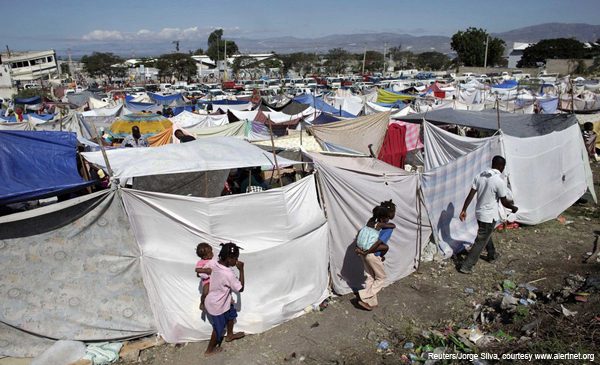
Johny Estor of Oxfam Great Britain talks about his work as a protection officer in his native city of Port-au-Prince, Haiti.
I was born in Port-au-Prince and have lived here all my life. I studied sociology after finishing high school. Before coming to work at Oxfam I was an HIV/AIDS program coordinator for a local organization. I came to work at Oxfam in March 2010, after the earthquake. I work as a Protection Officer.
My work as a Protection Officer has many sides to it. A Protection Officer’s main goal is to make sure that the rights of Oxfam´s beneficiaries’ are respected. My job is to ensure that the beneficiaries receive what they are supposed to receive without being coerced into giving something in exchange, such as money or other favors of a physical nature. We develop tools and methods for the Program Managers, who are the ones responsible for the different programs Oxfam runs, so they can prevent this kind of thing from happening. It’s not always easy to find out this information though. People won’t just come forward to say that they were forced to give away some of what they received for fear of retaliation. So a lot of these cases go unreported.
We do have ways to help victims come forward anonymously. We have set up a free telephone service that people can call to make us aware of potential protection issues taking place in the camps. We also have training sessions for community mobilizers and camp committee members to create awareness of protection issues. There are also complaint forms available that a person can fill out to report incidents that happen in the camps. With all these reports we are able to try and find solutions to make sure that everyone’s rights are respected.
I feel that our work has had a positive effect on the population. For example, when people were being moved to Camp Corail, which is a camp on the outskirts of Port-au-Prince that the government selected for re-housing displaced people, Oxfam was responsible for installing the latrines and the showers. We were able to do an evaluation and noticed that some things were missing, for example the latrines were not separated according to gender, there were no latrines for people with disabilities; in some cases there weren´t enough latrines; and most of the latrines had no locks. We raised our concerns to the team in charge of water and sanitation and a lot of improvements were made. I feel that improving people’s living conditions is just one of the positive results that a protection department can achieve.
The upcoming elections and the cholera epidemic have taken center stage and have had an effect on our work. A lot of plans and projects that we wanted to undertake with other Oxfam teams have now been put on hold so that the teams are available to deal with the cholera, which, of course, takes precedence over everything else right now. I hope that all of Oxfam’s efforts can help to diminish the spread of this disease to other parts of the country. I also hope that the elections won’t have a negative effect on the work that we are doing or have done.
I like the fact that the work we are doing is based on values. I feel that Oxfam can contribute to the changes needed here in Haiti. I hope that the new leader of this country is someone who is willing to guide the country to a better future.